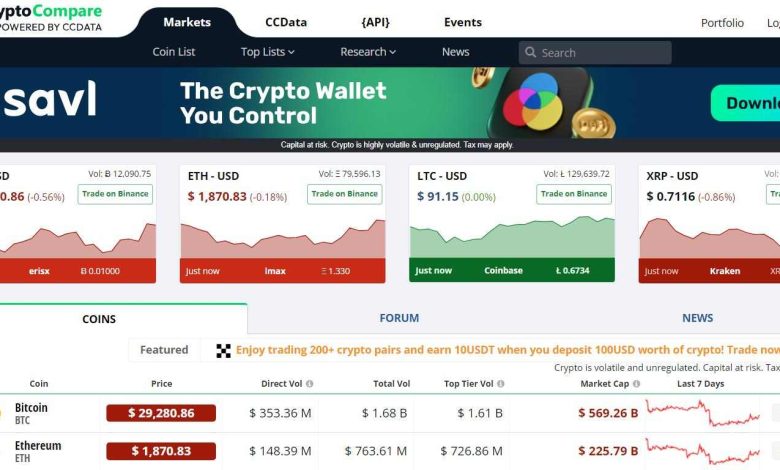Analyzing the Most Secure Crypto Exchanges

- Understanding the importance of security in crypto exchanges
- Key features to look for in a secure crypto exchange
- Comparing security measures of top crypto exchanges
- Tips for keeping your funds safe on a crypto exchange
- The role of regulation in ensuring security on crypto exchanges
- Case studies of successful security breaches on crypto exchanges
Understanding the importance of security in crypto exchanges
Understanding the significance of security in cryptocurrency exchanges is crucial for investors looking to safeguard their digital assets. With the increasing popularity of cryptocurrencies, the number of cyber threats targeting exchanges has also risen. Therefore, it is essential for users to choose platforms that prioritize security measures to protect against hacking and fraud.
Security in crypto exchanges involves various aspects, including encryption protocols, two-factor authentication, cold storage for funds, and regular security audits. These measures help prevent unauthorized access to user accounts and ensure the safety of funds stored on the platform. By selecting exchanges that implement robust security practices, investors can mitigate the risk of losing their assets to cybercriminals.
Investors should also be aware of the regulatory compliance of crypto exchanges, as platforms that adhere to legal requirements are more likely to have stringent security measures in place. Regulatory oversight helps ensure that exchanges follow best practices in terms of security and customer protection, reducing the likelihood of fraudulent activities.
Overall, understanding the importance of security in crypto exchanges is essential for investors to make informed decisions when choosing a platform to trade or store their digital assets. By prioritizing security features and regulatory compliance, users can minimize the risk of falling victim to cyber attacks and protect their investments in the volatile world of cryptocurrencies.
Key features to look for in a secure crypto exchange
When choosing a secure crypto exchange, there are several key features to consider to ensure the safety of your investments. One important aspect to look for is **security measures** such as **two-factor authentication** and **encryption** to protect your account from unauthorized access. Additionally, **cold storage** of funds can provide an extra layer of security by keeping the majority of assets offline.
Another crucial factor to consider is the **reputation** of the exchange. Look for platforms that have a **history of security** and **transparency** in their operations. **Regulatory compliance** is also essential to ensure that the exchange follows industry standards and regulations to protect users’ funds.
Furthermore, **liquidity** is an important consideration when choosing a crypto exchange. A platform with high liquidity can provide **faster transactions** and **better pricing** for your trades. **Customer support** is another key feature to look for, as responsive and helpful support can assist you in case of any issues or concerns.
In conclusion, when analyzing the most secure crypto exchanges, it is essential to consider features such as security measures, reputation, regulatory compliance, liquidity, and customer support. By prioritizing these aspects, you can ensure a safe and reliable trading experience on the platform of your choice.
Comparing security measures of top crypto exchanges
When it comes to comparing security measures of the top crypto exchanges, it is crucial to analyze various factors that contribute to the overall security of the platform. Different exchanges implement different security protocols to protect their users’ funds and personal information. Here are some key aspects to consider when evaluating the security measures of crypto exchanges:
- Encryption: One of the most fundamental security measures that crypto exchanges employ is encryption. This technology ensures that all data transmitted between users and the exchange is secure and cannot be intercepted by malicious actors.
- Two-factor authentication (2FA): Many crypto exchanges require users to enable 2FA to add an extra layer of security to their accounts. This security measure helps prevent unauthorized access even if a user’s password is compromised.
- Cold storage: Some crypto exchanges store the majority of users’ funds in cold storage, which is not connected to the internet. This security measure protects funds from online hacks and cyber attacks.
- Regular security audits: Top crypto exchanges often undergo regular security audits conducted by third-party security firms. These audits help identify any vulnerabilities in the exchange’s security infrastructure and ensure that they are promptly addressed.
By comparing security measures across different crypto exchanges, users can make informed decisions about which platforms offer the highest level of security for their crypto investments. It is essential to prioritize security when choosing a crypto exchange to safeguard your assets from potential threats.
Tips for keeping your funds safe on a crypto exchange
When using a crypto exchange, it is crucial to take steps to ensure the safety of your funds. Here are some tips to help you keep your funds secure:
- Enable two-factor authentication (2FA) to add an extra layer of security to your account.
- Use a strong, unique password for your exchange account and consider changing it regularly.
- Avoid sharing sensitive information such as your private keys or login credentials with anyone.
- Be cautious of phishing attempts and only access the exchange through official channels.
- Consider using a hardware wallet to store your funds offline for added security.
By following these tips, you can help protect your funds from unauthorized access and minimize the risk of potential security breaches on crypto exchanges.
The role of regulation in ensuring security on crypto exchanges
Regulation plays a crucial role in ensuring security on crypto exchanges. By implementing strict regulatory measures, exchanges can protect users’ funds and personal information from potential threats such as hacking and fraud. Regulatory bodies set guidelines for exchanges to follow, including requirements for customer verification, data protection, and anti-money laundering practices.
Compliance with regulations not only helps to safeguard users but also enhances the credibility and trustworthiness of crypto exchanges in the eyes of investors and the general public. Exchanges that operate in compliance with regulations are more likely to attract new users and retain existing ones, leading to increased trading volumes and revenue.
Furthermore, regulatory oversight can help prevent market manipulation and insider trading, ensuring a fair and transparent trading environment for all participants. By monitoring exchanges and enforcing compliance, regulatory bodies can detect and address any suspicious activities promptly, maintaining the integrity of the crypto market.
In conclusion, regulation is essential for maintaining security and trust in the crypto exchange ecosystem. Exchanges that prioritize regulatory compliance demonstrate their commitment to protecting users and upholding the integrity of the market. By working hand in hand with regulatory authorities, exchanges can create a safer and more reliable trading environment for all stakeholders involved.
Case studies of successful security breaches on crypto exchanges
There have been several high-profile cases of successful security breaches on crypto exchanges that have raised concerns about the safety of digital assets. These incidents serve as cautionary tales for both users and exchange operators, highlighting the importance of robust security measures.
One such case study is the infamous Mt. Gox hack in 2014, where hackers exploited a vulnerability in the exchange’s system, resulting in the loss of over 850,000 bitcoins. This breach not only led to the collapse of Mt. Gox but also shook the confidence of the entire cryptocurrency community.
Another notable example is the Coincheck hack in 2018, where hackers made off with over $500 million worth of NEM tokens. This incident exposed weaknesses in Coincheck’s security protocols and raised questions about the exchange’s ability to protect user funds.
More recently, the Binance hack in 2019 saw hackers steal 7,000 bitcoins through a sophisticated phishing attack. While Binance was able to cover the losses using its Secure Asset Fund for Users (SAFU), the incident highlighted the constant threat posed by cybercriminals.
These case studies underscore the need for crypto exchanges to prioritize security and implement best practices to safeguard user funds. By learning from past breaches and staying vigilant against emerging threats, exchanges can build trust with their users and ensure the long-term viability of the cryptocurrency ecosystem.




